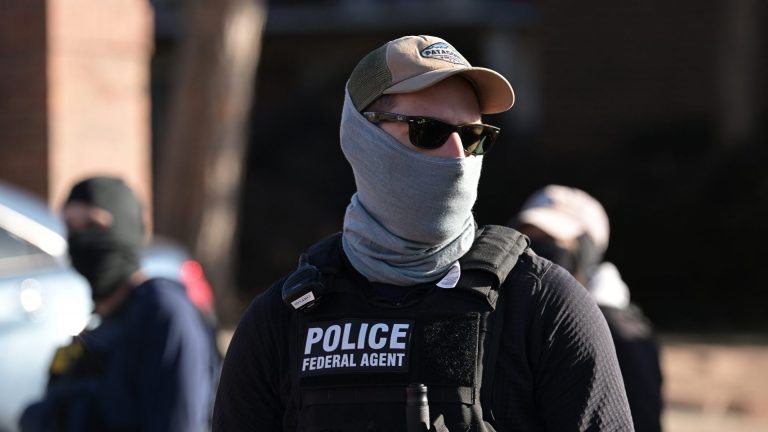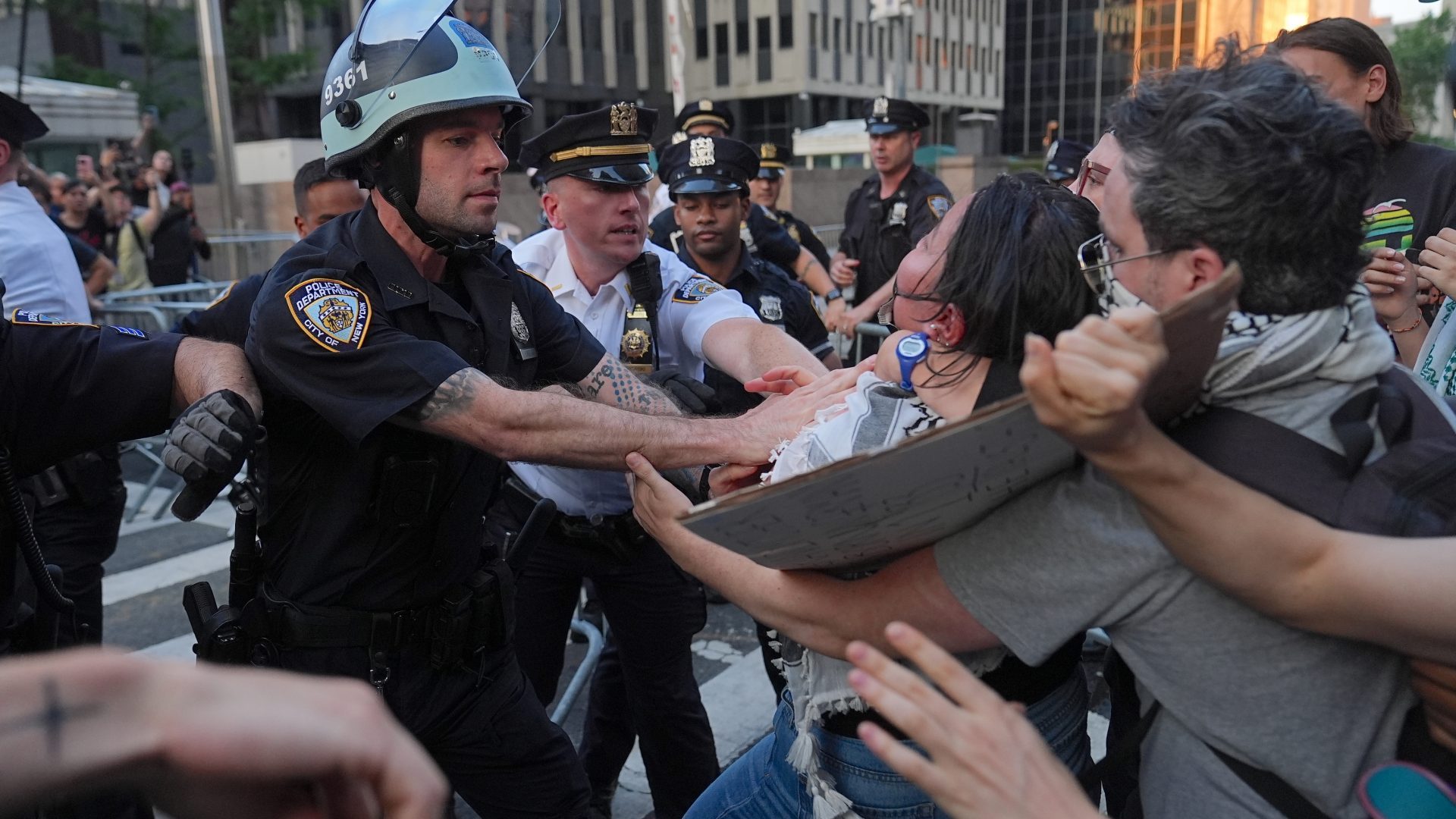On September 25, Emily Gallagher took part in a protest against immigration enforcement at Federal Plaza in Manhattan. Along with 11 other legislators, the 41-year-old New York state assembly member was there to determine if government officials were complying with an injunction ordering them to address overcrowding and unsanitary and inhumane conditions within the building. They held a banner which read ‘NYers Against ICE’.
In July, a video had emerged from Federal Plaza of two dozen inmates crammed inside a makeshift cell; with only emergency blankets for bedding, some were lying on the floor. Separated by a waist-high partition, a toilet stood a few feet away. In the clip, speaking in Spanish, a voice can be heard saying, “Look how they have us like dogs in here”.
The overcrowded conditions can be explained by the presence of federal law enforcement officers who, since May, have been stationed in the building’s hallways with the purpose of arresting foreign-born people emerging from citizenship and residency hearings in the building’s numerous immigration courts.
The elected representatives arriving at Federal Plaza in September had seen their demands to inspect the facility rejected once before. The second attempt was more alarming still. Far from gaining admission to the building’s holding quarters, this time, the delegates themselves (along with 70 demonstrators outside) were placed under arrest by agents from the Department of Homeland Security.
“I take inspecting prisons and jails very seriously as part of my job because that’s a group of constituents that people don’t really look out for or remember,” Gallagher tells me. “And with the situation going on of ICE abducting our neighbours, and the leaked footage of what was happening in Federal Plaza – in what is not supposed to be a detention centre, anyway, it’s supposed to be an office – it became clear that people are being held hostage in there.”
Representing Greenpoint, in Brooklyn, Emily Gallagher is an unlikely politician. Quick to laugh and entirely unguarded, her belief that “seeing elected officials arrested for trying to do their jobs [is] a real sign of authoritarianism” is surely justified. She goes on to tell me that of late she’s been using the A-word and the F-word, fascism, “interchangeably”.
“It’s important that we try [to fight] and that we don’t cave [or] capitulate to the terrorist in chief,” she says. In Greenpoint, Gallagher helps train local traders in how best to protect themselves should the goon squad come calling. “The first thing we’re doing is informing business owners that ICE is allowed in public areas, but they’re not allowed in private areas, so you need to hang up signs on your employees-only areas that say ‘PRIVATE’, because they have no business being back there,” she tells me.
“Once you let them in, they do whatever they want. It’s really kind of like a vampire story. You do not let them in.”
As it so happens, I know her patch rather well. With Queens to the north and Roosevelt Island and Manhattan to the west, Greenpoint’s end-of-the-line location at the uppermost point of Brooklyn makes it a neighbourhood in the authentic sense of the term. Its streets teem with people who live there.
Up on Franklin, at weekends, the pretty young revellers sipping cocktails at softly lit bars speak of gentrification. Two blocks west, you can still find bakeries where the staff greet you in Polish.
On a recent visit, I also discovered that within this once unloved and dangerous borough, there beats a spirit of stealthy resistance that extends beyond and below the protest of an elected representative. At the end of a stroll along Huron Street, I mentioned to friends that my eye had been caught by the frontage of a local bookshop featuring an LCD display bearing the words ‘FUCK ICE’. “Oh, that’s Archestratus,” I was told. “That’s Paige’s place. She’s a fixture of the community.”
Liking the sound of this, I popped in for a chat. As well as selling new and vintage cookbooks, and serving food and coffee in its small cafe, Paige Lipari’s shop hosts events and fundraisers that seem custom-made to aggravate the rabid right.
In the week of my visit, the now 10-year-old store held a meeting for Court Watch NYC, a nonprofit that sends observers to court cases involving immigrants and people of colour. With homespun elan, bake sales for Palestine, Planned Parenthood and the victims of the recent fires in Los Angeles have raised as much as $28,000 a throw.
“In this community, we all have the ability to connect with each other because of this space [Archestratus] and also the online space as well,” she tells me. “And it feels more solidified because we have both. Because of the events we’ve held in this store, the bonds feel a bit more tangible.”
Inevitably, the current source of botheration is a New Yorker based in Washington DC. Lipari says she wasn’t surprised when the American electorate decided to recommission The Donald Trump Show for a second season last autumn.
Recognising a predatory creep when she sees one, first time round, she established the advocacy group Women’s Table. In the days before she became a state assembly member, Gallagher spoke at one of its events, at the shop. “She was brilliant,” I’m told.
The trauma and outrage of the president’s second term has required a widening of the lens. In 2025, Lipari’s services to the community involve keeping an eye on the activities of a lawless cohort. Monitoring Reddit, WhatsApp and social media, when word arrives that ICE agents have placed their jackboots on the ground in Greenpoint, she springs into action, texting any local business that may be required to do a spot of instant deck-clearing.
Suggested Reading

I am MAGA’s perfect immigrant
“They’re going into the restaurant community and they’re just taking people,” she says. “There are places that are owned by people who are Hispanic and who have workers who are undocumented and who are being targeted. They’re not coming here, into a store run by a white lady, that I can tell you; they’re not targeting me. But they are targeting other people in this neighbourhood, some of whom I absolutely know.”
In Greenpoint, ICE is like a poltergeist. No one to whom I spoke for this piece has seen its agents at work, but the damage wrought is burdensomely real.
People report second-hand sightings outside barbershops at first light. There are accounts of undocumented cleaners being forced to hide in office blocks at the end of their morning shifts. Construction workers get the arm while buying breakfast burritos. “It’s confusing,” Lipari tells me. “It’s a mystery. It’s like they’re an invisible invading army.”
With the help of Google Translate, after returning from New York, I talked on Zoom with Juana and Josephina (not their real names), a Mexican-born mother and daughter who clean houses and restaurants. Juana is what the Americans call “documented”. Enmeshed in a process she describes as being “very, very slow”, Josephina is currently trudging her way through the immigration process.
Josephina has three friends who have been deported to Mexico. After being asked to show the documentation for his car, Juana’s mother’s cousin was taken to an immigration centre at which he was held for three months before being spirited out of the country.
With heart-cracking solemnity, the pair speak of traffic checkpoints at which ICE officials are also present. “We are very scared and nervous all of the time,” Josephina tells me.
I can only marvel at the obstinacy of those who approve of what’s happening. If such people have been to New York at all, they must have walked around with their eyes screwed shut.
Evidence of the contribution made by documented and undocumented immigrants abounds; working up a sweat, people for whom English is a second language (if it’s spoken at all) are everywhere. With an ingratitude that startles the mind, Trump and his lickspittles have failed to grasp that swathes of the nation they purport to lead would cease to function without the labour of the very people upon whose heads they’ve affixed a target.
Jorge, a documented Guatemalan-born local business owner, tells me that “the economy in New York would grind to a halt without these workers. It would not stand one day without undocumented people. They literally bring food to your table, either from working in the field or bringing it to your door.”
As to the current situation in a country in which he’s lived since he was six years old, he says, “It feels like I’m paying rent in your apartment when you don’t want me there. And I’m paying all the bills. We get up every day to go to work and make money and make a better living for ourselves. I pay my bills; I cause no problems. We just want to live.”
Like his near-neighbour Paige Lipari, Jorge sends text alerts to between “50 and a 100” undocumented friends from Guatemala and Latin America when he learns of the presence of ICE agents in Greenpoint. The men work in car washes, as mechanics, and in construction.
As people run for cover, the resultant shockwaves are crashingly predictable; the very notion that an army of American workers stands ready to take up the slack is a fiction. Jorge tells me he’s struggling to find gardeners to landscape an investment property he owns out on Long Island.
“People are panicking,” he says. “They don’t send their kids to school. They don’t go to work, and they don’t come out of their apartments.” On Zoom, in a break from her shift as a cleaner, Juana tells me that “a co-worker of my mother’s stopped working because she was so afraid of immigration. She has a baby with autism, and she doesn’t want to risk being deported and returning [to Mexico] with her baby in a bad state.”
As much as anything New York City reminds me of a line in a Springsteen song – out there “it’s just winners and losers and don’t get caught on the wrong side of that line”. One shudders at the fate of some of the people who are required to retreat into the darkness. In the depths of a frigid winter, I’ve seen undocumented people selling frying pans and toasters from blankets placed on the floor outside budget supermarkets. I’ve seen very young children on the G train selling candy from boxes.
But with high-end condominiums starting to crowd out the view of the Chrysler Building from streets approaching the East River, in Greenpoint, people who have nothing to fear (directly at least) from ICE are growing in number. In a metropolis in which the noticeably rich and the hardscrabble poor rub along cheek-by-jowl, the capacity of two communities to live in almost total unawareness of each other continues to amaze me.
“There’s a phrase, White Fragility, right, where white people hate to be confronted by their privilege,” Gallagher says. “They feel uncomfortable knowing that they have an easier life than other people do. So a lot of time people fall apart at the very concept of it rather than them using it as a weapon. And I think what we’re trying to do in this neighbourhood is to encourage people to see their power as something awesome that they [can] use, and to get them to use it not for their own benefit but for the benefit of the other communities.”
Another of the regulars at Archestratus is an activist who is looking to squeeze unexpected benefits from the inevitability of gentrification. As well as working in film and TV, Sophie Finkelstein teaches screenwriting to the children of immigrants at the City University of New York.
By way of contrast, at the start of the year, she recalls finding herself face to face with the complacency of the comfortable when wealthy neighbours assured her that ICE agents wouldn’t be darkening the doors of Greenpoint. “Who do you think works for you?” she told them. “Also, these vulnerable people are your neighbours.”
She tells me: “Let’s say when ICE comes… If 50 white moms showed up to protest, I think that could move [the needle], at least momentarily, right? So my next plan is to contact the people who are not vulnerable, to try and bridge the two communities.”
Talks with Lipari are afoot about setting up training sessions at the shop “for the non-vulnerable people to come in and learn what the fuck to do” in the face of Immigration and Customs Enforcement encroachment. She has an idea “to get the targeted people into some rich ladies’ apartment, because they’re not going to be looking there”
I don’t doubt that she can accomplish this. Clutching a caffeinated beverage of a peculiar colour, at Archestratus, Finkelstein might just be the most irrepressible person I’ve ever met. In response to my observation that she carries not a note of despair about her person, she says, “despair is a luxury item that we can’t afford. My students at NYCU, they’re not despairing. So, if my kids aren’t despairing, whose parents are the most vulnerable in the country, the least I can be is some kind of support to them.”
“It’s all about community,” Lipari tells me. “Because we keep being pushed by the system to forget the value of community. We keep getting sold something else. But we don’t need a lot. We just need each other.”
In what might just have been its own gesture of resistance, over at Citi Field, in Queens, I ended my day at a baseball game at which the dependably luckless New York Mets celebrated ‘Hispanic Appreciation Night’. In the stands, ticketholders flew flags from countries south of Texas and California. On the field, superstars such as Francisco Lindor, from Puerto Rico, and the Dominican Republican Juan Soto were earning scores of millions of dollars playing for a team that was less than two weeks away from missing the playoffs.
Up on the top deck, I had my ear chewed to ribbons by an agreeable old cove – let’s call him Bob, shall we? – whose every opinion seemed to have been designed with the intention of making me wince. Bob had voted for Trump, twice, and believed the United States was safer, and better off, for being in his hands.
He didn’t at all mind the presence of ICE agents on the streets. “I know not everyone being rounded up is a criminal,” he said, “but a lot of ‘em are.”
Between innings, I was asked what people in the United Kingdom think of the USA. “At the moment, many of us think you’re a laughing stock,” I said. Attempting to salve the look of hurt that flashed across his face, I added, “But I reckon there are people among you who might just be able to get you out of this mess”.









